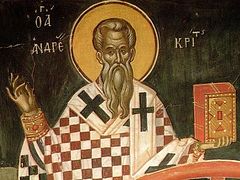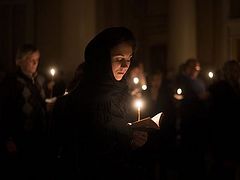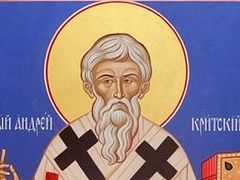Have mercy on me, O God, have mercy on me! This is the refrain chanted between the Troparia of the Great Canon of St. Andrew, read in its entirety on the fifth Thursday of Great Lent (precisely, at Matins on Wednesday night). The Great Canon is termed Great both for its length content-wise, yet also for its depth, its meaning. It is the soul’s dialogue with God par excellence. It is the song of repentance. And it recounts the history of mankind, our alienation from God and subsequent redemption in Christ. This year, due to the various precautions taken against COVID-19, not many will be able to hear this service in church. Yet, the Great Canon is readily available online and despite any work and commitments, it is a relatively easy service to read as a family. I encourage everyone to take two hours on Wednesday or Thursday of this week as may be convenient to read the Great Canon if we cannot make it to church due to limited availability. Now, we shall endeavor to examine the Canon ode by ode—there are nine odes—in a contemplative manner to better acquaint ourselves with the images presented by St. Andrew within the canon, both of the historic characters and the virtues and sins, passions and vices he reflects upon. Let us begin.
Ode One
St. Andrew in the First Ode brings to us the anguish and utter loss he is experiencing with regard to his fallen nature and any potential redemption in Christ. The first words of the Canon are: Where shall I begin to lament the deeds of my wretched life? How shall I begin, O Christ, to relieve my present tears? Immediately, St. Andrew transports us to the Fall of mankind from Paradise. He compares himself to both of our parents, Adam and Eve, and claims that his soul has been stripped naked of God, of the everlasting kingdom and all of its delights. Our desire to live in communion with sin has this direct result: We are disconnected from our Creator and Father, and we remain outside His eternal Kingdom, unable to experience the grace and redemption offered by Christ through the Church, foreigners to any sanctity, good deed, or God-pleasing endeavor. Yet despite this, in the words of the Eirmos of the First Ode, He has become to me a helper unto salvation, this is my God I will glorify Him, the God of my Father I will worship Him. He does not neglect me. He did not neglect my ancestors. He was faithful. I was unfaithful. My inability to accept this salvation and regeneration due to my obstinacy and pride has led me far from Christ. I become prey to the noetic wolf, and, like the next character St. Andrew introduces, Cain, I murder my own conscience, as Cain murdered Abel his brother from jealousy. Abel was assigned by God as a priest, one could say, to minister and offer sacrifice, and Cain was jealous because his own sacrifice was impure and cheap, and God rejected it. How often have we offered low quality oil, flowers, wine, or bread to God’s church and to the priests? Do we offer back to God the best we have? Pivotally, do we present Him with a sacrifice of praise; that is, do we give Him our life as a pure sacrifice? St. Andrew advises us to recall two parables by which we may draw an example of repentance and an indication of the fallen condition: that of the Prodigal Son and that of the Good Samaritan. We are the Prodigal Son. We ran from the Father’s merciful embrace, we have fallen from Grace, bruised and beaten by passing thieves—our sins and passions, which rob us of the Heavenly Kingdom. How can I once again acquire Salvation? Through confession. First, confession within a sincere heart before the Lord of heaven and earth. And then, the completion of this confession in the Holy Sacrament of Confession before the priest.
Ode Two
Look upon me, O God my Savior, with Thy merciful eye, and accept my fervent confession. St. Andrew begins the Second Ode with these words. Indeed, the Great Canon is his personal confession. It can likewise become our personal confession. We are surrounded by confusion. This confusion has its roots in sin. For by sin, disorder enters creation, it enters every corner of every heart, and this disorder gives birth to a myriad of evils in our world: wars, controversies, and strife. Yet, a harlot in the Gospel (as we will learn about extensively on Holy Wednesday) brought order to our condition’s disorder by confessing her sins in all humility before Christ, with tears at His feet pouring lavish myrrh. The Savior Himself confessed that she did would be commemorated eternally, wherever His Gospel is preached. This is mentioned in this Ode by St. Andrew, who in an intimate and spiritual manner, likewise offers the Canon as a tearful supplication of repentance. This Ode is laden with mages of the Fall. It is I who beheld the Tree and ate the fruit; it is I who tore the garment that the Creator first wove for me. I am responsible, I have fallen. The fig leaves are reproof of my self-willed desires. Now I am clad in a coat of disgrace. I have taken, as it were, the paints of sin and blotted the image fashioned in the beginning by the Savior. How has this occurred? Through the sinful choices I myself made. I have preferred a life of pleasure and material things to a life free of possessions. Could it be that the money we so crave and the possessions we so desire doom us to a lonely, disconnected existence? Could they be the fuel that ignites other passions? Could the passions be what truly isolate us? The love of money leads to many evils: adultery and murder included. My lustful desires have formed in me the deformity of my passions and have disfigured the beauty of my mind. Yet, Christ remembers well that the mind, heart, and soul of each person are beautiful, and He seeks to find everyone—even the lost coin—as we hear in this Ode. St. Andrew brings us two examples: David, who committed adultery and murder, and the Publican, who robed innocents of their hard earned wages, leading many to a multitude of sins out of economic disparity. Both found forgiveness by sincere repentance and tears. This same repentance is available to each one also. In concluding the Second Ode, St. Andrew lifts Seth, Enoch and Enos from the Old Testament before our eyes as reminders of those righteous examples we have blatantly ignored. Like Cain and Lamech, we are condemned murderers. Not of others, but of ourselves. Each one has murdered the interior man, using sins as stones to deform his or her soul. Like those who attempted to build the Tower of Babel, we too have made many plans and—however ambitious and lofty they may be—God has revealed to us that His providence alone governs, and it is His Will we should submit to and never our own. He has destroyed, O my soul, your schemes and ambitions!
Ode Three
Christ is the vanquisher of Death, as St. Andrew confesses in the Third Ode and as we will sing on Lazarus Saturday and Palm Sunday. We process to His Holy Passion and Holy Pascha in the assurance of the Resurrection, in the knowledge that Forgiveness dawns from the Tomb (Paschal Homily of St. John Chrysostom). Yet, how many of us actually execute the minuet details of our life according to this living Faith? Instead, St. Andrew admits we have made a mockery of heaven and earth by living lives no better than those who lived in Noah’s time. Perhaps compared to them one might argue we are multiple times worse! Like Abraham, we are called to make a permanent pilgrimage from the land of Hanan—that is the land of the sin and death—to the Promised Land, the Heavenly Jerusalem. Abraham in his old age left such a cursed condition, and we are called to do no less. If we do so, we will inherit the blessings our ancestors had. We will ask of Him life, and He will give life, answering each one’s petition unto salvation. Perhaps, should we follow the good course, we will also entertain angels unaware, as Abraham did at the Oak of Mamre. Abraham unflinchingly obeyed the Lord and was thus vouchsafed to entertain such divine guests. And he was vouchsafed because he was obedient. Alas! How many of us lack obedience to the Gospel and the Fathers? Isaac—Abraham’s only son—was to be offered as a sacrifice to God, as a foreshadowing of Christ’s supreme sacrifice on the Cross for the forgiveness of sins and the reconciliation of mankind to the Father. St. Andrew teaches us that if Abraham had obedience, then Isaac had strength and resolution. These are also pivotal preconditions of salvation. Unfortunately, this generation seriously lacks them. It has been said that this generation cannot manage a war, and nothing could be closer to the truth. Wars are won and lost depending on a nation’s collective strength, determination, and obedience. The same principal applies to the spiritual life. We cannot conquer the passions if we hear the church bells (though here in the West, we unfortunately do no have that joy!) and remain absolutely indifferent under the guise of, “it’s raining, I’m tired, it’s a long service, I don’t like the choir, the priest isn’t nice.” Build strength and determination and obedience. Overcome the squabbles by calling to your mind the fact that Christian worship was always a struggle in centuries past: whether it was Greek villagers hiking through mountains for hours on end to reach some remote chapel, or persecuted Christians in Asia Minor worshiping in secret for fear of the Turks, or Russian Orthodox Christians meeting in forests in weather well below zero to celebrate the Liturgy secretly during Communist rule—the point is one and the same: Christianity requires sacrifice. It requires unbreakable determination against all the odds. Reminding us of the Ladder which Jacob beheld stretching to Heaven, St. Andrew asks: Why then, hast thou not set foot upon the firm step of piety? Really, why? Figure out the “why”. Answer it, and act upon the answer. Perhaps we are dwelling in Sodom and enjoy the pleasures of sin? St. Andrew closes this Ode by telling us to flee the eternal perdition and damnation prepared for Sodom. Flee like Lot, O my soul, from the burning of sin; flee from Sodom and Gomorrah; flee from the flames of wanton desire.
And we, praying with St. Andrew, conclude this brief meditation on the first three odes of the Great Canon with the following troparion of the Third Ode: Reject not the prayer of those who praise Thee, O Master, but take pity on us and grant forgiveness to those who call on Thee with faith, O Lover of mankind!




